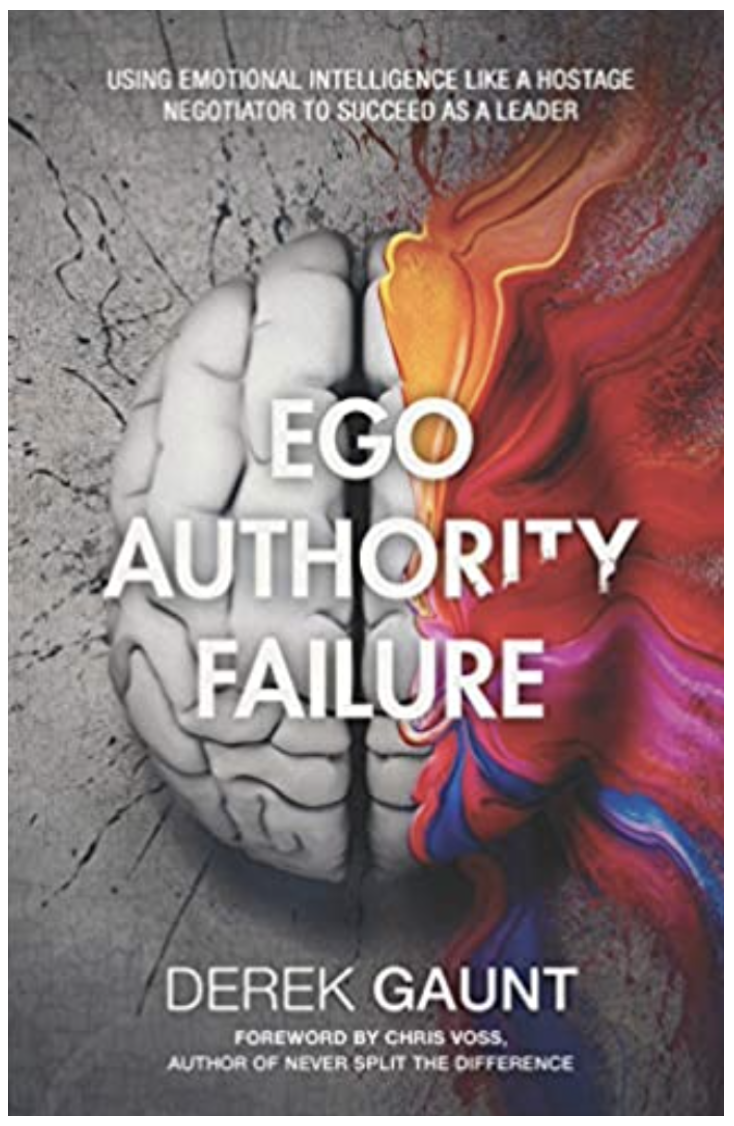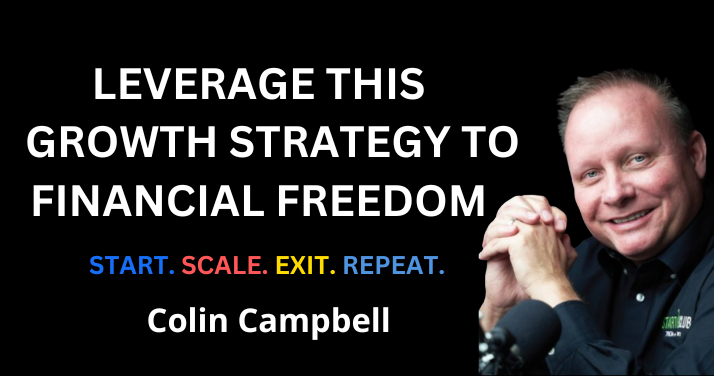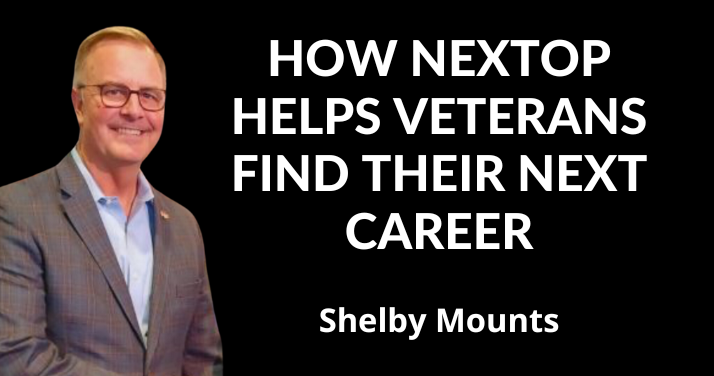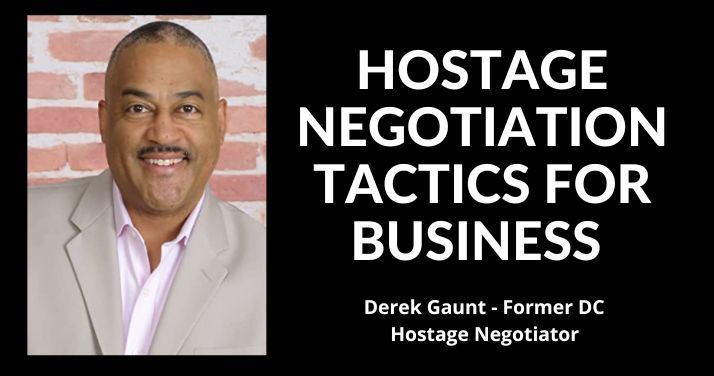
Derek Gaunt - Former Hostage Negotiator - DC
Sharpen your sales skills.
Extreme tested negotiation tactics for sales pros, buisness leaders, and entrepreneurs
In this episode of the Close The Deal .com Podcast, you'll learn from the former Commander of Hostage Negotiations Teams in DC. He has 29 years of law enforcement experience that's now applied in the business world.
As a negation trainer now, while he has many useful techniques,
Derek Gaunt's going to zero in on one key negotiating tactic you can put to use now.
He's an expert on human behavior, behavioral change and human nature response. Consider Derek your personal coach and negotiation trainer for emotional intelligence.
Derek applies the interpersonal communications skills he
learned during extreme hostage scenarios.
3 questions for you:
- Would you like to be a better negotiator getting better results?
- Would you be willing to apply just one very specific skill to sell more?
- Do you have the mindset needed to get to the next level of negotiating? Are you willing to change?
Derek’s passion comes across as he shares the one key skill that's a game changer.
As the industry expert, Derek talks about the mindset needed for success. Without the right mindset, it’s impossible to understand emotional factors that are key to your strategic business success. You will come to appreciate the importance of emotional intelligence.
Along Derek’s journey, he crossed paths with former lead FBI negotiator for the United States, Chris Voss. Derek and Chris work together at the Black Sawn Group, an advisory company for all things negotiation.
Connect or hire Derek
Derek is a sought afte keynote speaker at swat conferences. Hire him for your corporate events or business organizations. Consider a custom workshop.
Visit the Black Swan Group: https://www.blackswanltd.com/home
Linked In:
https://www.linkedin.com/in/derek-gaunt-2943a824/
Get Derek's book Ego Authority Failure here on Amazon.
Derek Gaunt Show Notes
Episodes 1- 9 were branded the Absolutely Mindset Podcast. Now the Close The Deal.com Podcast.
Ewell: Derek, I want welcome you to the Absolutely Mindset podcast. Before we get into a little bit of your background, I want to ask you two simple questions. I like to ask us of each guest, what are you grateful for today and what are you grateful from the past that helped you get to where you are
Derek: Ooh, what am I grateful for today? It's gonna sound cliche. I'm grateful that I'm still above dirt. I'm
Ewell: Me too.
Derek: for the fact that relatively speaking, those who are closest to me or in good spirits and they're in good health I've. I've got more in my rear view mirror than I do in my windshield at this point in my in my life. And the fact
that I'm watching people around me not realize that until it's too late has
been very sobering, sobering for me since I since I turned 50. And so I'm just
grateful to be alive. I'm grateful to have a family that loves and supports me
and that are still healthy and prospering.
[00:01:03] What am I grateful for from my past? I'm grateful. One of the things that sticks out for me is probably the first time that I applied for a specialized position back in my old days in law enforcement and. Going into this selection process, I
thought I was the cat's meow. I thought I was a no-brainer. This was gonna be a
ground ball for them, and I totally, I was totally unprepared for the interview
process.
What Derek learned "falling on his face."
And I fell on my face and it hurt. It hurt bad because in my mind there were people who wereless qualified than me who are now going to be selected because they answered the questions better. And what that taught me is taking things for granted, getting your mindset right in preparation for those types of evaluations and examinations is of critical importance.
You can't assume that you know everything. You've got to know that you know everything and that's the only way to put yourself in the best position possible to
realize success is getting that mindset right before going into. Any difficult
conversation and I considered interviewing for a specialized position or
interviewing for any job, a difficult conversation, and you gotta prep for
those.
[00:02:22] And I vowed that was gonna be the last time that it happened to me and. Coincidentally it was, but it was an eye opener because again, I thought that at that time I was young. I thought that there was nobody doing anything greater than what I was doing in the world of law enforcement.
So I thought it was gonna be an easy pick, and I wound up not getting selected at all. So that was a great wake up call for me.
Ewell: Those are the defining moments that stick with you. You obviously took it and used it to your benefit for sure.
Derek: Yeah. And it took me a while to figure out that stumbles like that, failures like that are just, opportunities to learn. Jocko Willin says it all the time, you didn't get that job that you applied for good failed on that mission that you undertook. Things didn't work out the way you planned good.
[00:03:11] Ewell: Yes.
New mistakes only!
Derek: because it should all be a learning experience. Back in my time as a hostage negotiator, one of my mantras with my team was, you're going to make mistakes.
Every job we go out on, we're going to make mistakes. I just wanna ensure that any mistake that we make going forward is a brand new one. It's not a repeated mistake because we're learning every time we make those mistake.
[00:03:35] Ewell: And that's the key. Yeah. You're in DC the first time I actually, and when I was with the Seafood Board, the first time we
walked the hill in DC, one of my, who, he became my mentor, but on the very
first trip, In the very first Congressional office with the Congressional
staff, all of our industry members standing around, he asked me about 10
minutes into the conversation, I'd been on the job about a week, and he asked
me, Ewell, "tell us a little bit about what the seafood board does."
[00:04:00] In my mind, I was there to listen
[00:04:03] Derek: Yeah.
Ewell: He put me on the spot in my first congressional office. I was young. I froze. I didn't know what to say. I wasn't prepared at all. I was so mad at myself as I was walking out that office. I was so embarrassed. And that became just like your experience reminded me of that experience when you were sharing that, and I turned it around never to not be able to answer a simple question as what do you do.
Derek: Yeah. I . Yeah, exactly. Exactly.
Ewell: Let me, so I'm looking at all, I'm looking at your
wall behind you and the, in the badges and the metals and the shields. Tell us
your background. How does one, you've got 20 years working in the hostage world of negotiation 29 years with law enforcement in DC area, how does
one land in the world of negotiating in probably the most toughest circumstances there might be.
Derek's path to becoming an incident command subject matter expert.
Derek: It's a voluntary appointment. It's a specialized assignment. It's an ancillary assignment meaning that I had a full-time job within my organization. And hostage negotiation was the part-time job. I was the brick glass in case of emergency guy. Yeah, and it's we were, when you think about hostage negotiators, you think about swat team operator.
[00:05:19] Cops are A type SWAT operators and negotiators are A types of the A types. We're the people that the police call when they get in trouble. And so there's a certain, there's a certain prestige that goes along with that incredible responsibility, but it's countered with a certain level of prestige.
And that's something that I wanted, I knew I wanted it early on. I started my law
enforcement career in the 80s. If you can remember back that far. And I became a
negotiator in 1997. And how that happened was as a patrol officer from 1988 to
about 91 thereabouts. Spent about 18 months in a patrol car doing the regular
stuff, responding to calls, responding to traffic accidents, writing tickets.
[00:06:08] But this was happening at the same time as the crack cocaine explosion in the US and so we, law enforcement were caught off guard by that. I'm sure you can remember those days where it infiltrated certain communities within our cities and we didn't know how to handle it. So we started to establish these specialized street
level narcotics units.
[00:06:35] And I knew I wanted to be a part of that because they were high speed, low drag. We're riding in beat up, old rental cars, we're wearing plain clothes. You can't discern us from regular citizenry until we jump outta the cars. And so when we
were charged with investigating street level narcotics.
[00:06:52] So we would look for buyers and dealers. We get, we stop the buyer. We get product on the buyer, we automatically have a distribution charge on the seller and then we go and lock up the seller. Invariably, all of these people had information about other crimes, and it wasn't long before I realized I could say specific things
in a specific manner to elicit specific responses from people who ordinarily wouldn't
give me any information and I would uncover information about other crimes they
would tell me about.
[00:07:25] Stolen property being stolen or sold. They would tell me about where a gun that was used in a homicide was disposed of, or they would tell me who they were buying their drugs from. And so I was intrigued because of the psychological aspect of interviewing these people. And I said, there's gotta be another level for me.
And I found that there was, in the criminal investigation section, I said, I want to be a
detective. And I realized that in 1994 I became a criminal investigator, and
now that's all I did was interview people. All I did was say specific things in
a specific manner to elicit specific responses from people who were inclined to
hide the information from me.
[00:08:10] And I was getting the information, valuable information, actionable information, and I thought this is the coolest thing ever. I took a couple of interviewing interrogation classes, taught me about the psychology of communicating with one person to and I said, what's more
Ewell: Yeah,
Derek: hostage negotiation that takes it to a that takes it to an entirely different level.
And so 97 when the, when openings came up on my hostage negotiation team, again, I competed for and was selected to the team. And from that point on, I never looked back.
I became a complete student of the game. I immersed myself at anything that had
to deal with crisis communication, interpersonal communication, and.
As I got promoted through the ranks, I became team leader, team commander, and that's the position I held up until the time I actually left back in 2017. So that's
in a nutshell how I became a hostage negotiator.
[00:09:04] Ewell: So that leads me to your book, which we got. I've
got, I got you got on the back wall. I've got it in my hand right here. And
you've, and you obviously you draw in a lot of those experiences that you've
got, but there's one line in the very beginning of the book that I think
probably, I imagine tees up a lot of your philosophy with everything you've
done.
And I'm fascinated before I ask this, before I read this law and get you the feedback
had a natural instinct, it sound like for this it just a year. It is. It is a
genuine passion.
Derek: So true. And that's, you and I talked offline
about mindset. That's part of the mindset. What are you passionate about?
You've seen t-shirts and posters and trinkets that all say the same thing. That
is, if you find something that you love, you'll never work a day in your life.
Ewell: yeah.
Derek: And I never looked at this as work. I've always
been in this because of the passion, because of the year. What's next? What's next?
What's next? How can I get.
I mentioned it earlier, total immersion, that's a result of the passion that you speak of. I totally immersed myself into this world and to the point where I knew more
academically and operationally than most of my peers.
Derek: Not because I was smarter than them, but because I
poured myself into it in a way that they didn't. And so
Ewell: All in.
[00:10:26] Derek: I all, in all,
Ewell: You have to be, otherwise could lives depend on you.
[00:10:32] Derek: It, it's not a game. It's not a game. And that's
what I try to impress upon. There are negotiators out there who do the work,
and there are negotiators who are out there because they get a cool t-shirt,
they get a ray jacket that says negotiator on the back.
The reality is a hostage taking, I don't care if it's in New Orleans, I don't care if it's in.
Oregon or in some small town in the middle of nowhere, whenever a hostage is
taken, it's, that's the sexiest game in town and everybody wants to be a part
of managing that thing. And I told the guys, the women on my team, I don't want
fence sitters and I don't want jacket wearers. I want people who want to work
because as you pointed out, lives are at stake.
This is not a game and you can, every time that our phones, at the time, pagers would go off alerting us to an event. I would tell them you need to tell yourself as soon as you receive that page when I get home.
Somebody who is alive right now may not be alive at the end of the day.
That's the gravity of the situations that we're going into. That's the mindset that I want you to go into when you're managing these things. But it starts to your point
with being passionate about it.
Ewell: Yeah, no doubt. So to your book, There's a lot. This line, it says, bottom line, it's not about you. It's about them knowing the why without asking the why, which,
which intriguing to me. And take us on the journey of your book. What inspired
you to write, this is your first book.
Why Derek becomes a book author of Ego Authority Failure
What inspired you to write your first book and I know you drew in your experiences
in ego, authority, failure, empathy, all that, just, and then we'll then we'll
take one element up from the book that you talk about and we'll drill down on
that. Something that the audience can take and use in their daily lives.
This book is fantastic. You get your back stories, too many back stories for you
to cover. You could probably spend 10 hours just talking about that. But let's
touch, let's start with that line. It's not about you, it's about them.
Derek: Difficult conversations, and we all have them weekly, if not daily, come with negative emotions and negative dynamics. When you enter these difficult conversations, you have a goal, you have an objective, you have an agenda. That agenda needs to be subordinated to what's going on with your counterpart, at least
initially.
[00:13:16] You need to view the world through their perspective. You need to convey to them that you understand what the impact of this conversation and ultimately what your goal and objective is going to have on them, because, If you allow those negative emotions and dynamics to remain unaddressed, as you're pushing through the conversation, they're not listening to you.
[00:13:42] They're focused on their internal monologue, revolving around everything, about the conversation that they hate, everything about you, that they hate. Everything about your pending ass ask that they hate, and you've got their brain is offline. Their brain is offline because negative emotions and dynamic.
[00:14:01] drive
defensiveness, and we only get defensive when we're threatened and when we are
threatened that amygdala fires up and it prevents the things that are supposed
to be occurring in your prefrontal cortex from actually happening.
[00:14:18] Your amygdalainitially cannot differentiate between a threat in a conversation and an active shooter running through your. Your amygdala will fire up the same way. It's kept us alive for thousands of years. And so any threat activates it impedes what's supposed to be going on in the prefrontal cortex. And in essence, your counterpart, as long as you allow those negatives to persist. Your counterpart is dumber than what they should be.
What does it mean to subordinate yourself?
So understanding, Your responsibility of subordinating yourself to the other
side, regardless of the dynamics or the hierarchy. You could be their boss in
that moment. You need to subordinate yourself to them. You need to handle them
deferentially. Imagine what the workplace would be like if all bosses handled
all direct reports.
Like hostage takers or hostage negotiators do hostage takers. What if you handle them with the same level of thoughtfulness and
deference that we do?
Hostage takers, how much better would the workplace be?
And so that starts with the mindset. It's not about you. In fact, that is
something that you need to repeat to yourself before you go into this conversation.
It's not about me. And let me assume that I've got something to learn as a result of this convers. Regardless of how long your relationship has been in play, five
minutes, five days, 50 years, when you enter in a difficult conversation,
there's something going on with the counterpart that you have no clue about,
and that's your job to put your goals and objective in the backseat.
Tactical Empathy comes first!
[00:16:00] Understand it's not about you, and try to figure out what does the lay of the land look like from their. Simplest terms, it's tactical empathy first. Your goal and
objective comes last.
Ewell: That's what I was getting ready. The empathy, it's interesting empathy as a hostage negotiator, that's how you, that's how you
draw out. You said you, you learned a skill of asking question. and getting
what you, the getting the desired information. Is that the base of it? Empathy?
Derek: It, it comes easier with empathy because of the
reciprocal nature of empathy. If I first show empathy towards you, I've now on
a subconscious level obligated you to show it to me, and so it's going to be,
I'll get less pushback from you. When I get to my ask, when I get to my goal
and objective, when I tell you what my agenda is, I'll get less pushback from you.
Why? Because I first took the time to understand what your frame of reference is. My ultimate goal as a hostage negotiator is to do what? To get the bad guy to surrender and get him to release his hostages. That's my ultimate goal. And. How many times
do you think I ever led with that? When I called inside the crisis site where I
called in the crisis site and I said, yo, listen, it's Derek from the police
department.
[00:17:24] I know my goal and objective is to get everybody outta alive. So why don't you put that gun down, let those people go, come out.
Ewell: Yeah. That's not gonna
Derek: Now. The answer is, I never led with that.
Ewell: Yeah.
Derek: Why did I not leave with that?
Because I haven't taken the time to understand how this is impacting you. Not only understanding it, but to articulate that understanding, cuz that's the critical piece of
understanding.
It's not about you, it's not you just understanding what the lay of the land looks like, but
you articulating so that they know you underst. Most of us get it right by
understanding where we fall down is our fear on whatever level to articulate it.
[00:18:04] Ewell: How does a boss, not in a hostage situation, but I
you could see where they want to get their point across. They want to be the
hammer. I think we've all been there before, but in a hostage situation, you
can't afford to be the hammer in that situation. You really have to be drawing
yourself back to ask those questions.
Derek: Hostage negotiation or work environment. The
hostage taker or the employee, they both know that I have the hammer. I don't
have to display it, I don't have to threaten with it. They know that they're
surrounded by 50 cops outside. In the workplace, they know that you have
ultimate control and authority over their professional future.
There's no need for me to wield it around and remind them of that. And so in either one of those situations, It's apparent, I don't need to refer to it. Let's focus on
what is the issue, what is the problem? And the problem is never the
counterpart. The problem with the hostage taker is never the hostage taker.
[00:19:13] It's how do we solve this problem? How do I turn that hostage taker? How do I turn that employee into a teammate in a problem solving?
Understanding Ego and Authority
Ewell: Yeah, so the title is very interesting, the Ego
and the Authority. Those two cause some issues sometimes.
Derek: Most times they do because the most times they are
left to run around unchecked. Ego and authority aren't 100% evil, unchecked,
ego and authority can be you.
I'm a history buff and I watched plenty of
documentaries. The failure of certain empires, the failure of certain military
missions from the largest to the small can all be traced back to ego and
authority.
All of them can be traced back to ego and authority. It's amazing to
me and the people who are now replacing the people before them in government,
in the military are doomed to repeat the same mistakes because they failed to
learn from history.
All you have to do, you study Saddam, you study Hitler, you
study how we wound up in Iraq in the first place and it's replete with ego and
authority and much, it had much less to do with actual actionable intelligence
that led us to do certain things.
Labeling is a foundational skill - how does it work?
[00:20:39] Ewell: Wow. Your book is fantastic. I wannatake the listener through one one of the subjects that you, I think I've heard you before, really drill down on, and that's labeling and it's a skill. I think anyone. Can you use for sure and will help a great, it it's such a, I'll let you explain it cause you do so good.
[00:21:00] I see a lot of value in it.
Derek: All right, so labeling is just an identification of an emotion or dynamic that you're picking up from your counterpart. It's as simple or as complex as that. It's, you are synthesizing the data you're getting from your counterpart and you're hanging the label on what you hear simply saying. It looks like, it seems like, it sounds like you look, you seem, you sound.
It's a foundational skill for us in hostage negotiation. In fact, in hostage
negotiation, we used to call it simply, we used to call it emotion labeling cuz
we were going after the emotional component at the Black Swan group. We removed emotions and just left it as labeling. Because if you're looking just for
emotions to label, there are many more dynamics at play that you'll fail to
recognize if you're only looking for emotions.
So we're looking for dynamics and emotions. In order to identify it's observing and
identifying the data that you're getting from the other side. Simple. It looks
like, it seems it sounds like it, it sounds like you're extremely frustrated
right now.
That's a clear way for you to demonstrate to another person that you're dialed into the conversation.
You're telling them this is the data you're giving. And you're repackaging that data and you're giving it right back to them. And because it's that it's their data
originally, you're always on safe ground. It's not you making something up out
of whole cloth. It's not you passing judgment. It's saying, this is what it seems
like to me.
Without saying what it seems like to me,
You're just simply saying it sounds like you're frustrated right now. Getting it right is
not of critical importance, believe it or not, making the attempt. Is where the
gold is found. Because even if you get it wrong, there's a law of negotiation
gravity that says the desire to correct is irresistible.
[00:23:13] So if I say to you, it sounds like you're frustrated right now, if you are indeed not frustrated, what does? What does that mean? You're going to tell me that you're not not frustrated. I'm angry. Okay. I didn't say you were frustrated. I
said you sounded frustrated.
And then clarification how is what I'm hearing wrong, But the desire
to correct is so I irresistible that they're gonna correct you.
And to your point, yeah. You're gonna pause after that.
Ewell Smith: Yeah,
Derek Gaunt: And the pause is the creating of, heard it before,
people call it the pregnant pause. Back in the law enforcement days, we called
it the effective pause at the Black Swan Group. We call it dynamic silence
because. It's a deliberate attempt on our part to create a void in the
conversation so that you fill it. Because at the end of the day, most people
have a certain level of discomfort with silence.
[00:24:08] Ewell: Early in your career you said you were asking
questions and you were getting answers. Were you doing that instinctively or
was this a skill that you grew into?
Derek: I did that instinctively. It wasn't until after I became a hostage negotiator that I realized I needed to shut up a lot more and stop asking questions to just sit back and listen to where the conversation was going, and pick out the nuggets that I thought needed to be expounded upon In every conversation, your counterpart is hiding information from you deliberately.
I do it. You do it.
Everybody does it. And I was driven to find out what that information
was that they were hiding from me. And instinctively when I became a part of
that street level narcotics team, it was a lot of questions. It wasn't until
after I became a hospice negotiator that I need, I learned I needed to stop
talking.
[00:25:05] If you're talking, you're not learning.
Ewell: All right. That's invaluable advice. Imagine how
different the world would be if we could all do that, like in normal
conversations across the board.
Derek: Yeah. Yeah.
Ewell: change society.
Derek: Would change everything.
Your'e on the front line of negotiations.
What should the mental preparation going into a negation look like?
Ewell: Wow. One, I'm gonna ask you a closing question and
then when, where people can find you, but the closing question is this I just
started asking.
What I put the words absolutely. A mindset together. When, what
does that mean to you when you hear those two words together? Absolutely.
Mindset in, in the context of what you do for a living.
Derek: absolutely means unequivocal, factual. It is mindset is about preparation. And there is an absolute responsibility on the part of anybody who is going to engage in a tough conversation to get their mindset right first.
Very few of these tough conversations come out of the blue. Yeah. Every now and again, you pick up the phone and all of a sudden somebody's blasting you and you're still trying to get your head around what the purpose of the call is.
[00:26:13] But more often than not, there is space in between the time that you learn that the conversation is coming and the actual conversation in that space is where the prep takes place. And getting your mindset right is simply saying to yourself,
okay. In this conversation, I know I'm going to be curious. I am going to go
into this conversation assuming I have something to learn in this conversation.
I have accepted the fact that at some point I'm going to get attacked. It's not going
to make sense to me, and it's gonna come outta left field. How am I going to
manage that vent? I'm gonna find a confidant that I can go to and vent about
the upcoming conversation. The good, the bad, and the ugly. All the blemishes
and the warts.
[00:27:01] The more I do that prior to getting into the conversation, less likely
that stuff is going to come out during the conversation.
Ewell: That's interesting.
Derek: Knowing my counterparts, negotiator, personality type, are they an assertive, are they an analyst? Are they an accom? Which 1:00 AM I, which one of those camps do I need to borrow from to make myself better?
Have I considered the negative opinions, assumptions, and impressions that the other side is likely harboring about me that they haven't said yet?
Ewell: Yeah.
Derek: And then, Am I mature enough to separate them from the problem? I mentioned it earlier, remembering that the person that you're dealing with is not the issue. Whatever you guys are coming together to talk about is the problem.
So how do I make this counterpart a teammate in this problem solving venture? And so absolute mean, it's un means it's unequivoc. Mindset means preparation. It's
unequivocal that you need to prepare yourself mentally before you go into any
of these conversations.
[00:28:01] Ewell: I love that . That's a whole other take on it. I
like that a lot. First, this has been a fascinating conversation. I think we're
gonna have to do this again sometime in the future. Where can people, a, where
can they find your book? And where can they find you? I know you, you're
with the Black S Swine Group, which the work that you all do and Chris Voss
does is fantastic.
First, where can they find your Book.
[00:28:27] Derek: You can find that on Amazon or or Kendall. I
recorded the book last year. If you have never recorded a book in your own
voice it's a life changing experience. I thought I was gonna go in and knock
that out in two days, and on day seven, I was still in. I was still in the
booth. And I'm proud of the product after it finally came out.
[00:28:45] And I'm pleased that I did it with my, in my own voice. So you can get it on Kendall or Audible books, Kendall. Amazon there is a, Second edition re-release that's coming out in October with some bonus material in it for parents. But you can
find me on LinkedIn. You can find me @Derekmgaung on IG.
[00:29:05] And of course you can reach out to us at https://www.blackswanltd.com/home
[00:29:12] Ewell: Derek, I wanna thank you appreciate your time
today and your advice is just solid. I appreciate it. Thank you,
[00:29:18] Derek: Thank you.
Subscribe
Close The Deal Leveraging
Multi-Unit Franchising. Click here.
Considering your first franchise, you've got options. Click here.
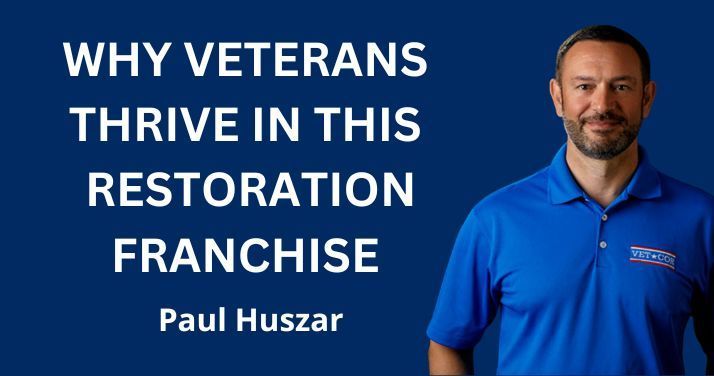
Don't miss a thing.
We share opportunities and updates with you
as they come our way
...network with us:
We will get back to you as soon as possible
Please try again later
New Paragraph

